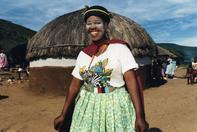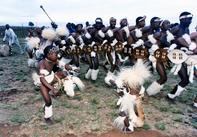Layout of Homesteads
Kin forms the basis of Zulu traditional life, which is centred on the umuzi 'extended homestead'. Until quite recently, the umuzi consisted of the headman 'umnumzane', with his wives and children, his younger brothers with their wives and families, and, in many cases, married sons as well.

With urbanization and the break-up of past social structures, the umuzi has become smaller and smaller, often including only one man and his wife, or wives, and children. Traditionally, the extended homestead was a self-contained economic unit, in which a complete life could be led.
Each umuzi had its own cattle and supply of milk, and its own fields on which maize and vegetables were grown to supply the needs of the inhabitants of the extended homestead. The architecture and layout of the umuzi were the same throughout Zulu society and reflected the status of the different wives.
The positions of the wives of a commoner were regulated according to the order in which they were married, the first wife being the chief wife 'inkosikazi'. With the king and important chiefs, the great wife, who was rarely the first wife, was chosen in consultation with the king's advisers after he had reached adulthood and was eligible to wear the isicoco 'head-ring'.
The umuzi was roughly circular in form and was built on sloping ground facing east wherever possible, with the slope falling away to the main entrance, so that the chief dwelling would be on the highest ground and would overlook the rest of the umuzi. In the centre was the cattle byre 'isibaya' where the cattle were corralled at night and the grain was stored in underground pits.
The perimeter of the byre is normally built out of closely packed stakes or, if there are no trees in the vicinity, out of stones. The cattle byre could be likened to the umuzi's temple: it was, and in many rural areas still is, the place where the ancestral spirits are thought to linger and thus where prayers are held. Here sacrifices are made and thanks offered for blessings received.
In the past, women generally did not enter the cattle byre, and no woman who was not a 'child of the house' was allowed entry, except on special occasions. However, during the 20th century, the tendency among men to seek work as migrants has forced many women to take responsibility for their husbands' livestock.
Traditionally individual dwellings were built between the fence of the cattle byre and the outer fence 'uthango' of the umuzi, around which prickly pear or acacia trees with long thorns were planted to provide a easure of protection against invaders.
The Chief Dwelling
The chief wife occupied the chief dwelling 'indlunkulu', at the top of the homestead 'umuzi', directly opposite the main entrance. Her eldest son was, and in traditional society still is, the chief heir and successor to his father, and he also occupied an important position in religious matters.
On the right of the main entrance of the umuzi, next to the chief dwelling, was the right-hand wife 'iqadi', who fulfilled a supplementary role to the chief wife. One of her functions was to provide an heir should the chief wife fail to bear a son.
On the left was the left-hand wife 'ikhohlo' who occupied the second position of dignity in the umuzi. In the case of a chief, the left-hand wife was often the first wife he married. She, with all the subordinate wives who formed part of her household 'amabibi', were entirely independent of the chief dwelling.
Social Order

A traditional Zulu umuzi was well regulated by strict etiquette and social discipline. Although a man might have a number of wives, there were seldom clashes or jealousy, as the wives were all independent. Each had her own home, and fields and cattle were appointed to her for her use.
All members of the umuzi had their place and function, but their status changed as they grew older. A bride, at first under the control of her mother-in-law, became a mother herself, and then a grandmother, and finally a respected elder in the community.
A boy first herded goats and then cattle. After this he graduated to the status of a young man with special responsibilities and, until the destruction of the Zulu kingdom in 1879, military duties.
After fulfilling these duties for some years, he was allowed to become a husband and father; in due course he was accepted as an adult member of the council of elders. Every individual passed through a number of well-marked stages, none of which could be entered into without preparation and ceremony.